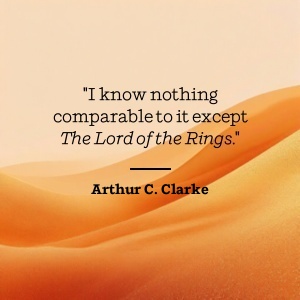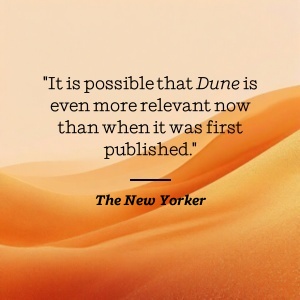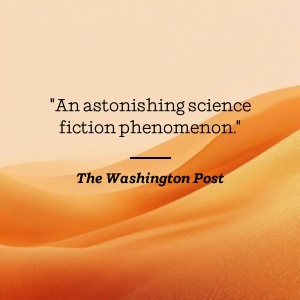

Frank Herbert's Dune Saga 3-Book Boxed Set: Dune, Dune Messiah, and Children of Dune



J**E
Unlike anything else out there, even after all these years
My rating is for the whole series; while I think that each book is progressively a little weaker, I still think that the saga as a whole is too compelling and unique to merit anything less than five stars.DUNE: Maybe it's the freshness in my mind of the recent (and outstanding) film adaptation; maybe it's just that I'm many (many) years older; maybe it's the way that fantasy has evolved since it was published (and in response to it). But whatever the case, even though I remembered Frank Herbert's Dune being a dense, difficult read, that turned out not to be the case as I revisited the world of Arrakis after a good thirty years. Indeed, you can see some of Herbert's pulpier edges here and there - some florid plotting, some big dramatic characters - all grounding the massive scope of the book and Herbert's quite frankly astonishing imagination in things that we can latch on to and understand. There's little need to revisit the plot here, especially thanks to Villeneuve's adaptations (which only impressed me more after this re-read, as I could see the ways in which he changed the source material to make it work as a film while never betraying its spirit); what I will say is that I was so much more acutely aware this time of the way that Herbert is viciously critiquing so much of the modern world - the exploitation of the middle east, the use of religion as a way to gain power, the scheming of those in control to keep the profits for themselves - and just how deeply cynical the book is. Even if you don't have knowledge of where the series goes from here, it's evident that Paul is never intended to be a wholly noble hero; indeed, no one in Dune comes out looking particularly good, with the compromises needed to keep power and the willingness to sacrifice others being so key to the methods of "winning" here that they're undeniable. The other thing you forget, though, is how willing Dune was to just be wonderfully weird, especially in the second half of the story, and it's where the book really shines; without that, you'd have a powerful but a little stiff exploration of power and exploitation of native populations, but with it, you get this fascinating science fiction epic that feels still pretty sui generis after all this time, even though it's impossible to read it and not think "oh, there is so much sci-fi and fantasy that wouldn't exist without this.'' It's got its flaws - some clunky dialogue, a few iffy pieces of characterization - but generally, they're minor and pale in the face of just what Herbert is going for - and what he largely accomplished.DUNE MESSIAH: When I revisited Dune, I found the book more accessible and less complex than I remembered, and I wondered how much of that I could simply chalk up to age (and the familiarity that came from the film). But now that I've read Dune Messiah? Oh, there's the complexity, weirdness, and density. In less than half the length of the original novel, Herbert delivers a truly subversive sequel that transforms the context and impact of its predecessor, giving us a book that turns Paul from a hero to a tyrant, turns a rebellion into a religious crusade, questions the nature of seeing the future, and so much more. And that doesn't even get into the oddness of the book itself, in which most of the major events happen off-page entirely, a conspiracy turns out to be about something wholly else than we think, a character returns from the dead in a bizarre way that only deepens the weirdness, and characters' actions can be maddeningly opaque. That all of this happens in such a lean volume is kind of fascinating; it's hard to think of another sequel that is this interested in completely revising the impact and meaning of its predecessor, changing the story from a heroic one to a tragic tale of the corruption of power. Dune Messiah isn't quite as solid as its predecessor, and part of that undeniably comes from the short length; there is a lot going on here, and Herbert's abbreviating of context and characters can lead to things being confusing even before we learn that most of the major events of the book happened between the volumes or even between the chapters. But it feels like a logical next step from the conclusion of Dune, and thematically/morally/emotionally, it's a fascinating way to keep the saga going in a way that reveals how little Herbert was really interested in the "white savior" archetype; instead, what he's given is a cautionary tale of the danger of such tropes, as well as a vicious allegory for the corruption of wealth, power, and control that rears its head in human nature - especially in a certain region of the world dense with oil - all done with an intent that transforms the previous book in compelling ways.CHILDREN OF DUNE: By the time I finished Dune Messiah, I was starting to remember just how complex and challenging Herbert’s series could be, but Children of Dune still feels like another step up in terms of difficulty and density, throwing us into a world of adults in 9-year-old bodies, warring prophecies, religious reform, tyranny and violence, and a whole lot more - but with a lot of things happening off screen still, a lot of characters hiding their motivations, a lot of ideas unexplained, and the plot beyond complex, with schemes within schemes within bluffs within feints. All of which could be manageable, if frustrating (I read and reread the Preacher’s messages multiple times, trying to parse their complex ideas, and still am not sure I followed it all), if Herbert had simply given us anyone to hang onto. With Dune, we had Paul, who was forced into dealing with his destiny and unspeakable choices, and while he was becoming harder and less approachable in Messiah, his regrets for what happened and efforts to ameliorate the damages still gave readers something to latch onto. But by the time we get to Children of Dune, there’s not a recognizably “human” character in our story, and the result is a book so full of ideas and philosophy that it forgets to give us anyone to like. The children are utterly alien and off-putting, Duncan is a walking computer, Alia is a monster, and Jessica…well, she’s still a Bene Gesserit, isn’t she? And all of that is before things start getting very weird towards the end, setting up the insanity of later books. But I think it’s here that I’m tapping out from my reread; I can admire the density of Herbert’s vision, and the nuance that he brings to all of the factions and power plays and groups, but ultimately Children of Dune feels like a book for mentats, not for people - it’s all ideas and cold machinations, with no humanity left for us to care about.
P**L
I’m glad I learned to read.
If you’ve only seen the movies, you need to read the books. The original Dune trilogy is one of the best sci-fi stories ever written. Yes, it’s a long story but it’s worth reading. The story was so engaging to me that I actually stopped watching TV for the couple of weeks it took me to read the three books. This particular set is packaged well and arrived quickly, and in perfect condition. It was quite a good value as well. I recently saw this same set at a local bookstore for nearly double the price I paid on Amazon.
D**N
Love these books
The Dune series by Frank Herbert is a masterpiece of science fiction. From the first book, Dune, to the later installments, Herbert builds a vast, immersive universe that feels both epic and intimate. The story revolves around complex political intrigue, environmentalism, religion, and power, all centered on the desert planet Arrakis, the sole source of the most valuable substance in the universe: spice.The characters are richly developed, especially Paul Atreides, whose journey from young heir to messianic figure is captivating. Each book layers in more depth, exploring not just the personal struggles of the characters but also the larger implications of their actions on the universe. Herbert's world-building is unparalleled—every detail, from the ecology of Arrakis to the intricate political factions, feels meticulously crafted.While the series can be dense at times, the thought-provoking themes and the richness of the storytelling make it a rewarding read. It's the kind of series that lingers with you long after you’ve finished, prompting reflection on power, destiny, and the consequences of human ambition.For any fan of science fiction, or even just someone who loves deep, intricate stories with strong characters, the Dune series is a must-read. It’s a monumental work that truly deserves all the acclaim it has received over the years.
P**D
Great quality books
These books were so inexpensive that I wondered what would be wrong with them. Tiny type? Thin pages that fell out? Nope. These are good-quality, mass-market paperbacks that my old eyes had no problem with, and held up well despite being carted all over creation while I read them. My only regret is that I didn't buy all six.And of course all the books are fantastic, Herbert was a political science genius and has left behind a crash course in the psychology of authoritarianism.
Trustpilot
2 weeks ago
1 week ago